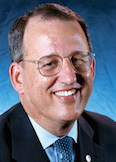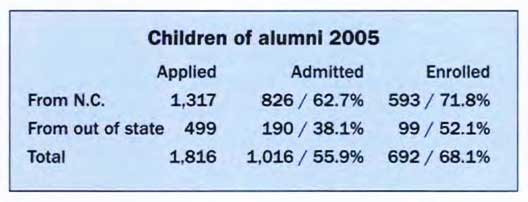Changes in Admissions
Posted on Nov. 15, 2005As the holidays approach and the year comes to an end, some of our readers are anxiously advising their high school senior sons and daughters about college applications. Understandably, some are curious about whether the special provision regarding scholarship recipients from outside North Carolina will have an impact on their chances for admission to Carolina.

Doug Dibbert ’70
Admissions policies have evolved over time. For many years, the percentage of out-of-state students in the entering freshman class was 15 percent. However, children of alumni and recipients of full scholarships were not counted in the 15 percent — although once admitted and enrolled, they were charged out-of-state tuition. This resulted in an actual out-of-state percentage that was closer to 21 or 22 percent.
In 1986, one of the 15 UNC System institutions that have an out-of-state enrollment cap (the N.C. School of the Arts is exempt from the cap) reported that its out-of-state percentage in the entering freshman class was 35 percent. Concerned that the N.C. General Assembly might legislatively set a punitively low cap for all campuses, the UNC System’s Board of Governors set a hard cap of 18 percent for each of the 15 campuses. (More recently, the UNC System modified the policy slightly to permit N. C. A&T State University to exceed the 18 percent to admit additional minority students into its engineering program.)
 The special provision passed by the 2005 General Assembly permits each UNC System campus whose board of trustees chooses to adopt this policy to count recipients of full scholarships from out of state as North Carolinians “for all purposes,” which has been interpreted to include tuition. Because the special provision also indicates that the institution is to manage this policy in such a way as to have “no fiscal impact,” it is anticipated that any campus that participates will grow slightly in the number of students entering from outside North Carolina.
The special provision passed by the 2005 General Assembly permits each UNC System campus whose board of trustees chooses to adopt this policy to count recipients of full scholarships from out of state as North Carolinians “for all purposes,” which has been interpreted to include tuition. Because the special provision also indicates that the institution is to manage this policy in such a way as to have “no fiscal impact,” it is anticipated that any campus that participates will grow slightly in the number of students entering from outside North Carolina.
In the discussion that preceded its vote to adopt this policy, UNC’s Board of Trustees and UNC Chancellor James Moeser emphasized that the University would continue to grow the number of entering North Carolina resident students. Our University leadership is strongly committed to assuring that this growth enhance the educational experience of all Carolina students.
Had this policy been in place for this year, it is estimated that it would have affected 71 students among an entering class of 3,751. There is an expectation that this change in policy will increase the number of Morehead Scholars and increase Carolina’s total of full merit scholarships. Further, it is expected that the Educational Foundation will not lower its fundraising goals but will instead be able to devote more of the funds raised for needed facilities renovations in addition to retaining its ambitious scholarship objectives. The steady increase in out-of-state tuition had resulted in a decrease in Morehead Scholars and made it harder to raise sufficient money to fund all of UNC’s athletic scholarships.
What might this special provision mean for alumni children who apply to Carolina? As the entering class increases slightly, there could be an accompanying slight increase in the number of children of alumni who are admitted. As the accompanying chart shows, among the entering freshmen this fall, 692 are children of alumni, or 18.4 percent of the class. Last year, out-of-state alumni children were admitted at a rate of 38 percent — roughly double the rate of other out-of-state students.
No doubt Carolina’s admissions policies and their implementation will continue to evolve. What has and will continue to guide these important decisions is our continuing commitment to ensure that the educational experience of every Carolina student remains at the highest level. Carolina’s students are best served by being among a diverse class of intellectually curious, high achievers who share Carolina’s proud tradition of active, responsible engagement.
Yours at Carolina,

Douglas S. Dibbert ’70
